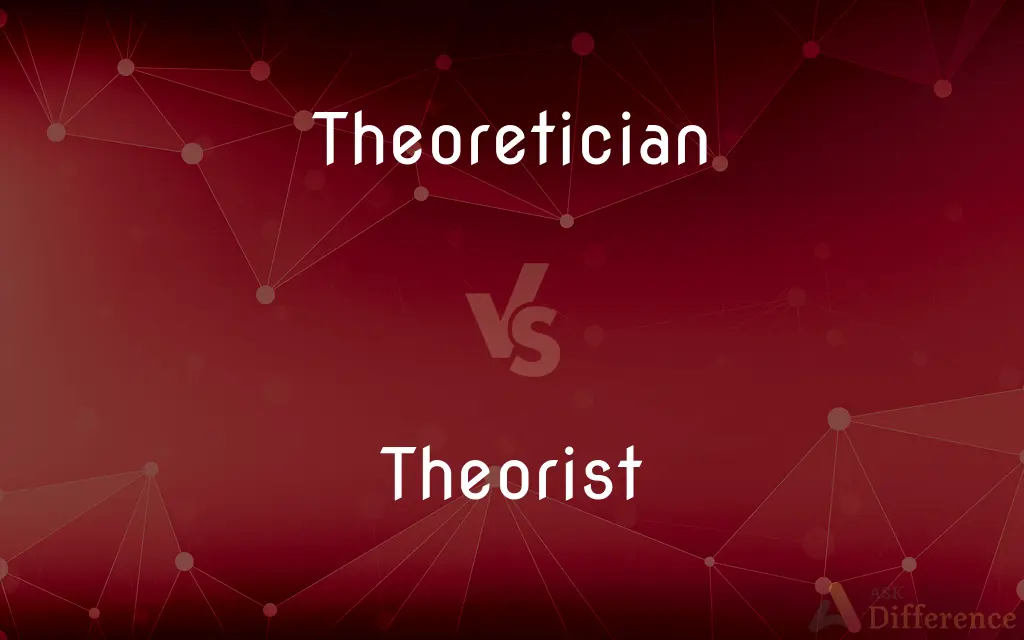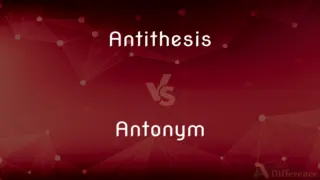Theoretician vs. Theorist — What's the Difference?
By Fiza Rafique & Urooj Arif — Updated on April 22, 2024
Theoretician delves deeply into the theory behind concepts, focusing on comprehensive understanding, while a theorist may propose new theories based on observations.

Difference Between Theoretician and Theorist
Table of Contents
ADVERTISEMENT
Key Differences
A theoretician is primarily concerned with the systematic study and development of theoretical frameworks, often working within established theories to deepen understanding. On the other hand, a theorist is generally someone who develops new theories, often based on empirical data or existing knowledge. They might not delve as deeply into the philosophical underpinnings as a theoretician does.
Theoreticians are usually found in academic and research settings, focusing on advancing theoretical knowledge in fields like physics, philosophy, or economics. Whereas theorists can be found in various fields, including those that involve applied sciences and social sciences, where they formulate theories that explain or predict real-world phenomena.
In terms of contribution to their respective fields, theoreticians help in expanding the foundational aspects of knowledge, enhancing and refining theoretical models. In contrast, theorists often work on creating frameworks that can be tested and used practically, thus directly impacting applied research and development.
The approach of a theoretician is often more abstract and conceptual, aiming to build on existing theories to reach a deeper level of understanding. Theorists, however, tend to be more practical in their approach, aiming to solve specific problems or explain particular phenomena through their theories.
When it comes to public recognition and influence, theorists are often more in the limelight due to the nature of their work which frequently addresses current issues and practical applications. Theoreticians, while they might remain more in the academic shadows, are crucial for providing the necessary theoretical groundwork that theorists use.
ADVERTISEMENT
Comparison Chart
Focus
Deepens understanding of existing theories
Develops new, often practical theories
Setting
Primarily academic and research-oriented
Varied, including applied fields
Contribution
Enhances theoretical frameworks
Creates testable, practical frameworks
Approach
Abstract and conceptual
Practical and problem-solving
Influence and Recognition
Less public, more foundational
Often public and directly impactful
Compare with Definitions
Theoretician
A specialist in theory who enhances and refines existing knowledge frameworks.
The theoretician worked on expanding Einstein's theories of relativity.
Theorist
A person who formulates theories to explain phenomena.
The biologist is a well-known theorist in evolutionary studies.
Theoretician
A researcher who contributes to the foundational theoretical knowledge in a field.
She published a groundbreaking paper as a theoretician in economics.
Theorist
Someone whose work involves developing frameworks that can be empirically tested.
The theorist developed a new model that predicts weather patterns more accurately.
Theoretician
An expert who provides deep insights into theoretical aspects of science.
As a theoretician, her work was crucial in the theoretical physics community.
Theorist
A professional who applies theoretical knowledge to practical issues.
Urban planners are often theorists who apply theories to city development.
Theoretician
Someone who studies the principles behind various phenomena without practical application.
Theoreticians often remain more engaged with conceptual debates than practical outcomes.
Theorist
An influential figure in science due to practical applications of their theories.
Her status as a theorist was cemented by her theories' widespread use in clinical psychology.
Theoretician
An academic focused on the philosophical underpinnings of theories.
He is a respected theoretician in political philosophy.
Theorist
An innovator in science who proposes new ideas to address problems.
As a theorist, he introduced several new concepts in chemistry.
Theoretician
One who formulates, studies, or is expert in the theory of a science or an art.
Theorist
One who theorizes; a theoretician.
Theoretician
Someone who is expert in the theory of a particular science or art
Theorist
Someone who constructs theories, especially in the arts or sciences.
Theoretician
A theorist
Theorist
One who forms theories; one given to theory and speculation; a speculatist.
The greatest theoretists have given the preference to such a government as that which obtains in this kingdom.
Theoretician
Someone who theorizes (especially in science or art)
Theorist
Someone who theorizes (especially in science or art)
Common Curiosities
Where do theoreticians typically work?
Theoreticians typically work in academic and research institutions.
How do theorists contribute to their fields?
Theorists contribute by creating new, testable theories that often have practical applications.
What defines a theorist?
A theorist is defined by their development of new theories that often address practical problems.
Do theorists need to be skilled in empirical research?
Yes, theorists often need strong empirical research skills to develop and test their theories.
How does the work of a theoretician impact society?
Theoreticians provide the essential theoretical groundwork that helps in the advancement of knowledge and informs practical developments.
What is the primary focus of a theoretician?
A theoretician focuses on deepening the understanding of existing theoretical frameworks.
What is the difference in the approach between a theoretician and a theorist?
Theoreticians take an abstract and conceptual approach, whereas theorists are more practical and problem-solving oriented.
Are theoreticians involved in practical applications?
Theoreticians generally focus more on theoretical advancements than direct practical applications.
What educational background is typical for a theoretician?
Theoreticians usually have advanced degrees in their specific field of theoretical study.
What skills are essential for a theorist?
Critical thinking, problem-solving, and a strong foundation in empirical methods are crucial for a theorist.
Are there famous examples of theorists who changed their fields?
Yes, many theorists such as Darwin in biology and Keynes in economics have profoundly impacted their fields with new theories.
How do theoreticians and theorists contribute differently to technological advancements?
Theoreticians help in understanding the fundamental aspects of technology, while theorists often develop new technologies or improve existing ones through their theories.
Can a person be both a theoretician and a theorist?
Yes, many professionals blend both roles, deepening theoretical knowledge and creating new theories.
How do theoreticians and theorists interact in the scientific community?
They often collaborate, with theoreticians providing theoretical insights that theorists use to formulate and test new theories.
Is being a theoretician less prestigious than being a theorist?
Prestige varies by context, but both roles are highly respected, although theorists may receive more public recognition.
Share Your Discovery

Previous Comparison
Antithesis vs. Antonym
Next Comparison
Cubicle vs. CubicalAuthor Spotlight
Written by
Fiza RafiqueFiza Rafique is a skilled content writer at AskDifference.com, where she meticulously refines and enhances written pieces. Drawing from her vast editorial expertise, Fiza ensures clarity, accuracy, and precision in every article. Passionate about language, she continually seeks to elevate the quality of content for readers worldwide.
Co-written by
Urooj ArifUrooj is a skilled content writer at Ask Difference, known for her exceptional ability to simplify complex topics into engaging and informative content. With a passion for research and a flair for clear, concise writing, she consistently delivers articles that resonate with our diverse audience.















































